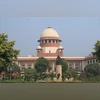The Supreme Court on Friday sought responses from the Centre and the state government on a plea of Rashtriya Janata Dal against a Patna High Court order setting aside the amended reservation laws in Bihar that had led to raising of quotas for Dalits, tribals and backward classes from 50 per cent to 65 percent.
A bench comprising Chief Justice D Y Chandrachud, Justice J B Pardiwala and Justice Manoj Misra took note of the submissions of senior advocate P Wilson, appearing for RJD, that the plea needed to be decided.
"Issue notice and tag with the pending pleas," the CJI said.
On July 29, the top court, while hearing other similar 10 pleas, had refused to stay the high court order that set aside the amended reservation laws in Bihar that enabled the Nitish Kumar government to raise quotas 50 per cent to 65 per cent.
The bench, however, had agreed to hear the petitions of the Bihar government against the verdict.
The state government has also moved the top court against the high court judgement.
More From This Section
In its June 20 verdict, the high court declared that the amendments, passed unanimously by the state's bicameral legislature in November last year, were "ultra vires" of the Constitution, "bad in law" and "violative of the equality clause".
A division bench of the high court had allowed a bunch of petitions challenging the Bihar Reservation of Vacancies in Posts and Services (for Scheduled Castes, Scheduled Tribes and Other Backward Classes) (Amendment) Act, 2023 and the Bihar (in admission in educational institutions) Reservation (Amendment) Act, 2023, while "leaving the parties to suffer their respective costs".
In a detailed judgement running up to 87 pages, the high court had made it clear that it saw "no extenuating circumstance enabling the state to breach" the 50-per cent cap on reservations laid down by the Supreme Court in the Indra Sawhney case.
"The state proceeded on the mere proportion of the population of different categories as against their numerical representation in government services and educational institutions," the high court had pointed out.
The amendments had followed a caste survey, which put the percentage of Other Backward Classes (OBC) and Extremely Backward Classes (EBC) at a staggering 63 per cent of the state's total population, while the SCs and STs were stated to have accounted for more than 21 per cent.
The exercise was undertaken by the Bihar government after the Centre expressed its inability to carry out a fresh head count of castes other than the SCs and STs, which was last held as part of the 1931 Census.
(Only the headline and picture of this report may have been reworked by the Business Standard staff; the rest of the content is auto-generated from a syndicated feed.)

)